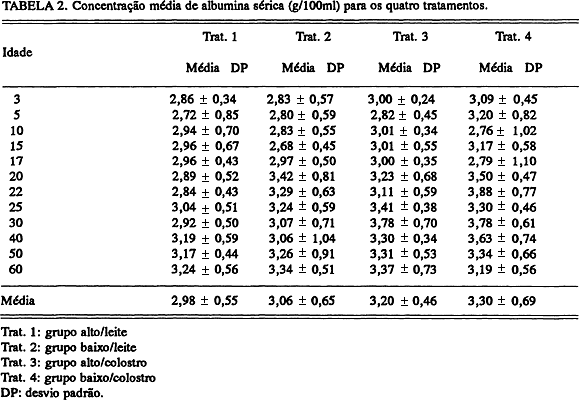The objective of this study was to evaluate the protein fluctuation of 32 Holstein newborn calves under different milk feeding programs. Animals with high and low condition of acquired passive immunity, were splited in two groups, with and without extended colostrum feeding. The treatments were: T1 - high/milk; T2 - low/milk; T3 -high/colostrum; T4 - low/colostrum. Total protein (TP), albumin and imunoglobulin G (IgG) present in the serum of the calves were evaluated. Calves of Tl and T3 showed higher concentration of TP and IgG as compared to T2 and T4. TP and albumin concentration were higher (P = 0,0001 e p = 0,059) in T3 and T4 in relation to animals in T1 and T2. The lowest concentration of PT and IgG were higher (p = 0,082 e p = 0,0001) in Tl and T3 as compared to T2 and T4. The date when the lowest concentrations of TP ocurred in Tl and T3, 40 days, was superior (p = 0,0012) to 20 days found in T2 and T4. The same ocurred to IgG (p = 0,060) with dates of 50 and 40 days for high (T1 and T3) and low (T2 and T4) groups respectively. Animals that received colostrum (T3 and T4) showed, only for TP, higher (p = 0,0002) concentrations in relation to the minimum concentration, which was registred at the age of 30 days. The date when the lowest concentration of IgG occurred was not different between animals that received colostrum and milk (40 days). According to the results it is suggested that colostrum in the diet has a positive effect in the serum protein synthesis, which in addition to immunoglobulins play an important role in the serum protein fluctuation of the newborn calves.
colostrum; serum proteins; passive immunity; calf



